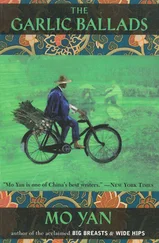‘I haven’t got a mother.’
Cardamom was startled. She put her arms around Wang Pusheng and they saw her shoulders jerking. For the first time, Cardamom was crying a woman’s tears.
Nani, no longer maudlin, wept quietly along with several of the other women.
After a while, Cardamom stopped, picked up the pipa and flung it away. ‘It’s useless! It’s made everyone cry! With only one string it sounds worse than plucking cotton wool!’
Shujuan noticed a change in the women. They knew now that nowhere was safe, nowhere was off-limits to the occupying troops. They had imagined this was a secret corner that the war had, by some lucky fluke, overlooked. But the arrival of the Japanese soldiers this evening had disabused them of that idea. Three hundred thousand soldiers had seeped into every corner of Nanking, every alleyway, every home, and every nook and cranny.
Shujuan got up to go, and found her eyes were wet with tears too. She had actually let those women make her cry!
It might have been the dying boy soldier, or perhaps it was Cardamom’s childish marriage proposal that got to her. Or maybe it was the tune that Cardamom was strumming on the single pipa string, a familiar one south of the Yangtze River, called ‘Picking Tea’. Now that southern China had fallen, all that was left of it was ‘Picking Tea’, played on a single string.
Thirteen


When the women in the cellar woke up in the morning, Cardamom’s bed was empty. George said that, when he got up at daybreak to heat water, he had seen her staggering drunkenly around the courtyard. He had tried to persuade her to go to bed, but she had ordered him to go to her house to get three new pipa strings. She said the pipa sounded awful, because it only had one string left. How could he go? George said. He didn’t know where she lived. She had replied that everyone knew how to get to the Qin Huai River. The house she belonged to was right on the riverbank, and her pipa strings were kept in the drawer of her dresser; he couldn’t possibly miss them. George tried to pacify her by saying he would go once it got light, but she said she could not wait. Wang Pusheng would be dead by then. She wanted to be able to play to him properly.
George had gone about his chores thinking she was back down in the cellar sleeping off her drunkenness. He was sure that, when morning came, she would have forgotten her mad idea.
Cardamom’s absence affected everyone in the compound. They were all on edge. When, at nightfall, she still hadn’t returned, Father Engelmann and Fabio went up to the attic to talk to the girls. The two clegymen had to stoop uncomfortably in the confined space, as if they were praying.
Fabio spoke first. He told the girls there was no news of Cardamom.
Father Engelmann interrupted him. ‘It’s no good trying to screen you girls. We have to assume the worst. That Cardamom has been taken by the Japanese and subjected to who knows what tortures…’
As the girls listened, the blood drained from their faces. Now that violence might have been inflicted on someone they knew, it suddenly became very real. They had hated Cardamom. They had fought with her. Now they thought of her as a young girl with a most unjust fate. She had been sold from brothel to brothel like a little dog. Would she have been willing to do what she did had she had a choice? Possibly not. People always said whores had no heart, and yet Cardamom risked her life to get pipa strings just so she could play a better tune for Wang Pusheng. As they sat dull-faced listening to Father Engelmann, they asked in their minds: Why Cardamom? She was too young. Gradually, tears welled up in their eyes. They’d rather God had swapped any of those prostitutes in the cellar for Cardamom.
‘I want you to get your things together and move down to the cellar straight away,’ said Father Engelmann. ‘Fabio and I and some other teachers hid from the fighting down there during the 1927 Nanking Incident. We were safe even though both armies ransacked the church compound several times. The cellar is much safer than the attic.’
‘Is that really appropriate?’ asked Fabio doubtfully. ‘Those women are completely intemperate in everything they say and do –’
‘There’s nothing more important than safety,’ said Father Engelmann firmly. ‘Off you go, children.’
By dinner time, the girls had moved to their new home and the soldiers were ensconced in the workshop. If they were discovered by the Japanese, the priest would just have to do his best to explain that they were wounded civilians. Whether or not he would be believed was in God’s hands. It was Dai who suggested the move; it was clear that he felt the men had no choice in the matter. They must protect the women and girls.
* * *
A curtain still divided the cellar in two, but the side that had belonged to the soldiers was now where the schoolgirls arranged their bedding. That night they ate their meagre supper in the cellar rather than the refectory.
Their meal was interrupted by Fabio calling down from the kitchen.
‘Xu Xiaoyu, come upstairs please.’
The girls looked at each other. Had the impossible happened? Had Xiaoyu’s father actually managed to come and rescue her?
They crowded round one of the ventilation shafts and, peering upwards, saw Xiaoyu’s pretty feet come to a halt before a gleaming pair of men’s leather shoes. Then they heard a choked cry: ‘Dad!’
Shujuan learned later that in order to rescue his daughter, Xiaoyu’s father had sold one of his stores in Macau. Then he had returned to Nanking, but discovered that money was worth nothing; the Japanese did not need money to get what they wanted. He was a good businessman so he went into business with the Japanese, putting antiques, jewellery and paintings their way, selling his integrity and his conscience. Finally he got the laissez-passer he needed and could get his daughter out. Getting into Nanking was as hard as getting to heaven, but leaving it was as difficult as getting to the universe beyond.
Xiaoyu crouched down and called through the shaft to the watching faces below: ‘My dad’s come to get me!’ She sounded as if she were saying: ‘An angel’s come to get me!’
No one said anything. Even Anna, whom Xiaoyu had promised to take with her, was glum-faced and silent. It was wishful thinking to imagine that someone this lucky would remember her promises.
Xiaoyu got to her feet and the girls heard her say: ‘I want to take two classmates with me, Dad!’
‘Don’t be ridiculous!’ said her father roughly.
‘I do!’
Her father hesitated. The girls held their breath. Finally he said: ‘All right. Who do you want to take?’
Xiaoyu went through the kitchen and climbed down the ladder. Fifteen girls stood there, not daring to make a sound. Xiaoyu had the power of life and death over them. The women on the other side of the curtain were just as silent, as if the choice of who were going to be the lucky ones mattered enormously to them too.
Xiaoyu looked first at one, then at another. Most of them knew they had no prospect of being chosen, even though they would gladly have jumped at the chance of being a servant in the Xu family household.
‘Anna,’ said Xiaoyu.
Anna, flushed with the honour of being chosen, slowly stood up and went to stand beside her friend.
Xiaoyu looked at the remaining faces, which were increasingly anxious and despondent. Shujuan was full of regret that she had not made it up with Xiaoyu, but it was too late now. She could only feign indifference as to whether she lived or died.
Читать дальше














